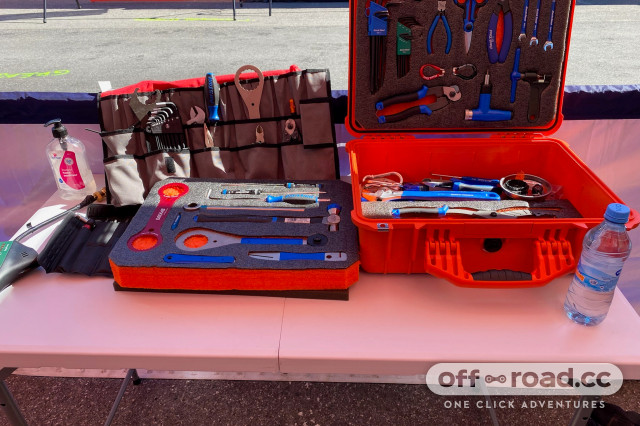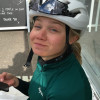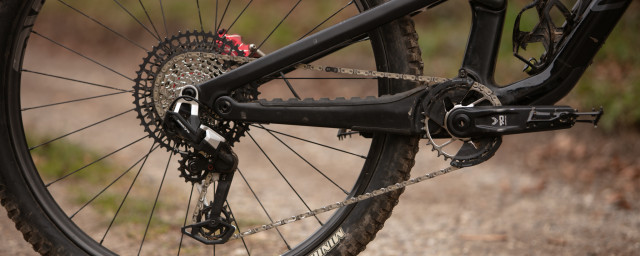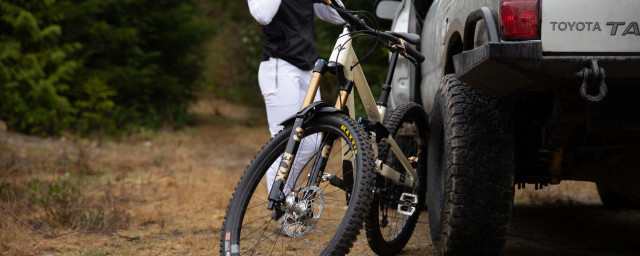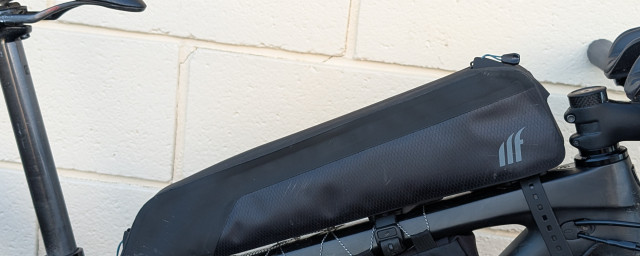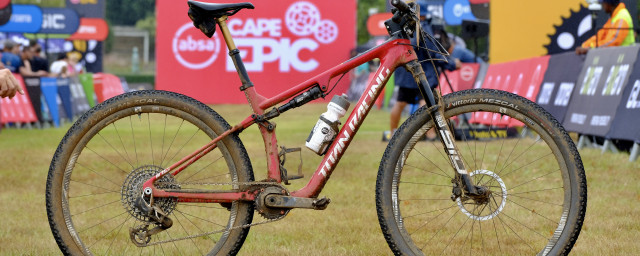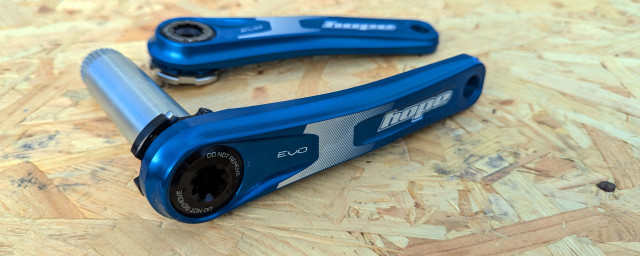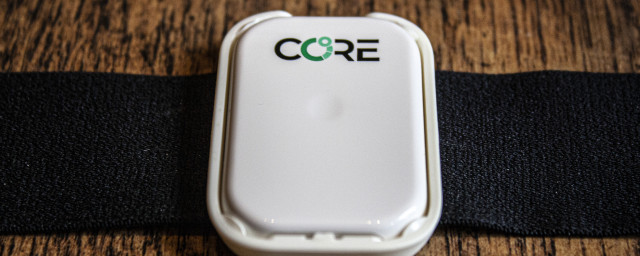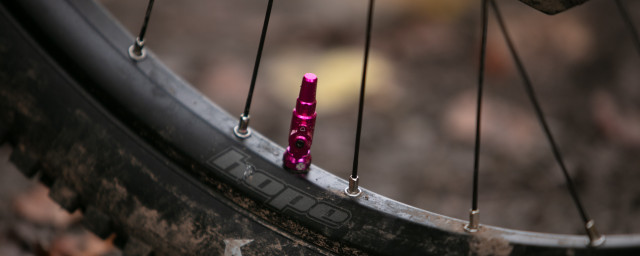UCI MTB World Championships 2022: Behind the scenes with Team GBR's mechanics

The 2022 UCI MTB World Championships are done and dusted and, while it's been great to see the big names race for the rainbow jerseys at Les Gets, there's been a number of people working hard to ensure that all the bikes are in fine fettle. We have chatted with two mechanics from team Great Britain, Callum Wyllie and Chris Hinds, to find out what goes on behind the scenes.
- Cross-country mountain bikes: understanding their design
- Best hardtail mountain bikes 2022 hardtails for every budget
- Road bike vs mountain bike: exploring the differences
- To start off with a bit of background. How did both of you get to be mechanics at the World Champs?
Cal: This is my first season working with the mountain bike team at British Cycling, I was working away in my local bike shop as a mechanic and had the opportunity to head out to Germany as casual staff and did well enough to get offered a job as a full-time mechanic with the team in April, and I’ve been working with them ever since.
CH: It’s been a few years since I was a shop mechanic but I’ve always loved working on bikes so I’ve been keeping my hand in working on my own and friend's bikes in my own workshop. When Cal called me asking if I wanted to work at Worlds I thought he was playing a trick on me. I initially wasn’t sure whether I’d be the best choice as I’m not working on the range of bikes that frequently. But a lot of the work doesn’t require you to be the most technically proficient mechanic but also get along with the rest of the team and relate to riders in what can be quite a high-pressure environment. Apparently, I fit the bill!
- What does a normal day comprise?
Cal: I don’t think there is such a thing as a ‘normal day for us, one day you could be filling out customs paperwork amongst a long queue of truckers, other’s you’re bleeding brakes in an underground garage at 11:30pm, and occasionally you manage to get out for a pedal in beautiful locations (if you get up early enough). Race day is incredible though, there is nothing like bike racing, regardless of discipline, or if you are staff or a spectator. The buzz of riders flying past while you’re trying to make out messages on the team radio over the deafening noise of cowbells and horns is second to none.
CH: It’s also heavily dependent on the weather gods, we were fairly lucky with the weather this week being dry bar a couple of days. But that one day of rain meant setting up 4 extra pairs of wheels with mud tyres, then stripping and replacing them with dry tyres when the weather improved again. You can plan a bit but there are no certainties with bike racing, all it takes is one crash to have a lot of work on your hands to fix things before race day. It’s hard work but when you see it all come together on race day and you’re standing in the tech zone (AKA the pits) cheering your riders on (and praying or no mechanicals) it’s an absolute rush.
- Can you explain how being a team mechanic at a mountain bike race works?
Cal: Race day is without a doubt my favourite part of the job, being right in the mix is such a cool experience and doesn’t ever get old. You’ve done your part in that all main pre-race checks are done on the bikes the night before, apart from setting tyre pressures up which we tend to leave until as late as possible, and you are passing the bike over for the riders to do their bit. You’ll agree with each rider about what spares they have in the tech zone and what is a feasible fix that’ll keep them going through the race, versus what is game over.
From someone that’s worked in a bike shop and had customers coming in with a puncture, you can chat away to them, go and grab a coffee and then fix the puncture in and around other jobs, but when you’re in a race you have a rider screaming into the tech zone and hopping off their bike for you to do a wheel swap quick enough that they don’t lose too much time. I'd say on average most mechanics will get a wheel swapped over in around 25 seconds during a race, from the rider arriving to them being pushed back off again. Sometimes you get a heads up from another member of the staff team on the radio that a rider has a mechanical which is great to get ready and psych yourself up for a rapid changeover. We’re all on team radios around the course giving updates and time checks, and it’s quite easy to get really into the race and feel like a spectator with a really good viewing spot, but at any moment you need to be ready to jump into action.
CH: A lot of the work goes on ahead of the race itself, and if it’s done well it makes the race itself easier to deal with. Making sure the bikes are in perfect working order prior to the race is possibly the most important part of the pre-race prep. Tyre pressures and suspension setup are maybe more important aspects in MTB than in road, so there’s a lot of preparation and testing before the race itself, sometimes varying tyre pressures by 0.5psi.
For the elite race with the forecast looking unpredictable, we have three sets of wheels set up, spare dry, spare wet, alongside a set to go to the start in case of any last-minute issues. Riders can get outside assistance up until two minutes before the start so, with two mechanics, one will be in the pits while another waits at the starting pens with spares in case of a last-minute puncture. During the race, riders can essentially change any part of the bike if the parts are there. The most common issue is punctures, you’ll see wheels set up with a 6mm allen key in the axle ready to go. After that, it’s drive train issues, slipped chains, broken rear mechs etc.
Some riders will have all these spares, alongside a seat post, pedals and spare shoes to cover any eventualities. If you’ve watched the Elite women's race you’ll see Evie Richards stopping in the pits for a change of shoes!
Hopefully, though we’re not dealing with these things and are instead providing updates to the rest of the team regarding positions etc and helping with feeds and water hand-ups.
- What are the easiest and the hardest parts of the job?
CH: For me, the hardest part is accepting I’ve done what I need to and moving on to the next job. When it’s someone’s World Championships on the line it’s very easy to second guess yourself and keeps checking and rechecking the bike. You need to trust that you’ve double-checked everything and that it's good to go, other than that you’d never sleep. As 2nd mechanic the easiest bit for me is the race itself and the pits, it’s where you see everything come together and unlike Cal, I’m more likely to be holding a bike or part when a rider comes in than doing much work myself. Cal might have a very different view on things.
Cal: Easiest part - actually getting your tools out and working on bikes can be quite relaxing for a mechanic when you work in quite a small group of staff, you have to muck in and help with so many other aspects of the camp that when you do get time to do mechanic work it’s nice to do what you’re actually there for. The hardest part is how physically tiring the job can be and on the back of that having the mental strength to stay focused, when you’re working with riders at this level you want to make sure you do everything in your power to make sure they have the best race they can.
- What else do you do at the World Champions apart from fixing bikes?
CH: It’s a small team so everyone has to pitch in, we’re mainly responsible for bike upkeep and setting up team zones, this means a lot of walking and carrying. We averaged 12km a day carrying wheel bags to and from pits and vans. Outside of that we’ll help the soigneurs do hand-ups in the pits, get the riders anything they need and generally just be there for any curveballs. On a long week like this, we also don’t have an infinite number of bidons so there’s a scramble to grab bottles before the crowd gets to them, at the end of a race it can be like a pitch invasion!! If you’re in the team area you’ll also spend a lot of time telling people that Tom Pidcock isn’t hiding in the tent.
Cal: From when you get up in the morning til you go to bed at night you are ‘on’ and in mechanic mode. This could be sitting at dinner discussing tyre options with riders or waiting on course for riders to pass and check they are happy with their set-up during training. Everything we have with us is designed to be packed away and moved easily, so throughout the week there is a lot of repacking from the accommodation down to the course and back again. Each night we have a team meeting with the whole squad before dinner and a staff meeting after dinner to go through all the finer details of the next day.
- Did you work with specific riders' bikes or with a lot of different ones? And what was the coolest bike?
Cal: We both ended up working with all the riders throughout the week, we had asked riders to send messages with any work required so we could use a checklist but also come and have a chat about their bike as well. We worked with junior riders up to elite riders, which gave us a nice mix of some riders being super precise with any changes to their set-up, which can be really satisfying when you nail it, and some of the younger less experienced riders hanging around while we work on their bikes, and talking them through any changes we (and the coaches) recommend for better performance.
The nicest bike is a tricky one. Although life would be easier if all the riders were on the same bikes it also gives a good bit of variety to your workload. Cam Orr’s Santa Cruz Blur might take the win for me, as well as being an insanely nice set-up, it’s great to work on as well.
CH: I really like the Scott Spark that Annie Last is riding at the moment, the internal suspension setup and integrated cockpit just make for a very clean aesthetic. I’ll always have a soft spot for a Santa Cruz Blur though so Cameron Orr’s setup with SC Reserve 28s was my bike of choice. One of the best things about the job is the variety of bikes you get to work on, each one has its own idiosyncrasies and quirks that can enamour to you. As a lover of matte black bikes, the Supercaliber with the iso strut is a beautifully designed bit of carbon! Special shout out to Max’s Syncross Silverton one-piece carbon wheels. Those are just wild.
- Do you have any special rituals you do before big events like this?
Cal: Not really any rituals apart from team socks and an extra espresso in the morning. I like to try and make sure I get around every rider before they race to wish them luck.
CH: Check tyre pressures, double check tyre pressures, maybe check them one more time to be sure? Nah nothing really. Fist bumps with everyone before game time, but beyond that, the schedule is so tight that you’re always just trying to think a couple of steps ahead of where you are at that moment.
- Do you get to hang out with the riders a lot and do they appreciate you?
Cal: We do spend a fair amount of time with the riders, throughout the season we’ve normally gone for Airbnb’s rather than hotels if possible so that we are all in the same place and can get a good environment going. We all eat together, and a few of the guys like to come and mooch around when we’re on the tools and tinkering with bikes, they all live and breathe cycling and want to be around it as much as possible.
We rarely do a job that doesn’t come with thanks, it’s sometimes what keeps you going knowing that any change or fix you make to a bike is going to be appreciated and that your opinion is respected. Riding for GB means there is a huge stock of spare parts and different options, which is great although sometimes riders can overthink tyres, pressures, or chainring sizes, and they like to have a chat about it and see what your take is.
CH: For the week we live and work really closely with the riders. We’re always discussing bike set-ups, tyre choices and any issues or niggles that have been happening. On training days and pre-race there’s a lot of chat and banter with riders coming and going from the workshop. I think ( I hope!) everyone appreciates our work and everyone’s usually quick to help out or bring us food, water and biscuits when we’re flat-out in the workshop.
Come race day, different riders have different ways they want to pre-race prep, some will be ultra-relaxed and have a laugh, and others will want quiet to focus and collect their thoughts. We try to give the riders the headspace and environment they want at the time to race at their best. They are a great group of people though and they make the hard days worth it.
If you wish to follow the boys on social media for more insightful bike content, you can find Chris on Instagram here and Callum here.
[These views are of individual members of staff rather than British Cycling as a whole]


